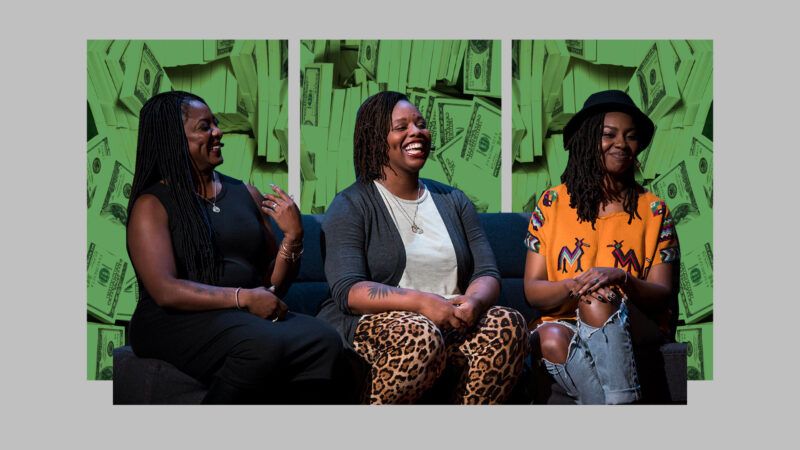Why Is Facebook Censoring Articles About How BLM Used Donations To Buy a $6 Million House?
Reporting that makes Black Lives Matter look bad should not be covered up by social media companies.

When George Floyd, an unarmed black man, was killed by Minneapolis police in May 2020, donations poured in for Black Lives Matter (BLM) from people who thought they were funding racial justice initiatives and helping to ensure bad-actor cops would finally be held accountable for their violent actions.
Surely some of the donations did go toward that. But $6 million of them went toward paying for a 6,500-square-foot house in Southern California, replete with a pool and a bungalow.
Worse still, when the New York Post reported on Black Lives Matter's organizational malfeasance, Facebook censored the story. Meta, which owns Facebook, has deemed the content "abusive."
In October 2020, Black Lives Matter received $66.5 million from generous donors. Later that same month, a man named Dyane Pascall—the financial manager for BLM co-founder Patrisse Cullors' consulting firm—bought the $6 million house. "Pascall transferred ownership of the house to an LLC established in Delaware by the law firm Perkins Coie," Sean Campbell reports at Intelligencer, which "ensured that the ultimate identity of the property's new owner was not disclosed to the public."
Since then, the house's raison d'etre has been…somewhat unclear. It serves as a sort of secure location—providing high-ranking members of the organization a place to sleep when they need it—but also a place to record content for posting on social media, both for the BLM account and for Cullors' own projects (like a peach cobbler cooking video, notes Intelligencer).
More from Campbell:
On March 30, I asked the organization questions about the house, which is known internally as "Campus." Afterward, leaders circulated an internal strategy memo with possible responses, ranging from "Can we kill the story?" to "Our angle — needs to be to deflate ownership of the property." The memo includes bullet points explaining that "Campus is part of cultural arm of the org — potentially as an 'influencer house,' where abolition+ based content is produced by artists & creatives." Another bullet is headed "Accounting/990 modifications" and reads in part: "need to first make sure it's legally okay to use as we plan to use it." The memo also describes the property as a "safehouse" for leaders whose safety has been threatened. The two notions — that the house is simultaneously a confidential refuge and a place for broadcasting to the widest possible audience — are somewhat in tension. The memo notes: "Holes in security story: Use in public YT videos."
None of this is technically illegal, but all of it is ill-advised if your goal is to ensure donors trust that their money will be used to advance racial justice, not personal enrichment for the founders. And these reports, from both Intelligencer and the New York Post, are extraordinarily damning for an organization whose leaders have already come under scrutiny for their extravagant spending. Cullors' posh real estate holdings totaling at least $3.2 million were the subject of a prior New York Post piece that ended up being censored by Facebook, unable to be shared on the platform.
This isn't the first time the Post has run afoul of the Facebook overlords. In February 2020, the publication ran one of the earliest pieces introducing the theory to U.S. audiences that the coronavirus may have been the result of a lab leak—a theory that became popular in May 2021, with The New York Times, The New Yorker, and The Atlantic running articles that began to take the theory seriously, and one that still, months later, hasn't been discredited.
Facebook's fact-checkers somehow deemed the Post's reporting untrue, but reversed the ban on sharing man-made lab leak information in…May 2021.
And, in October 2020, after the Post published a report on Hunter Biden's laptop, Twitter suspended the publication's account while Facebook took steps to limit the reach of the article. Just last month, The New York Times confirmed that the initial reporting checked out with its own story on the Biden laptop. (Former head Jack Dorsey commented in November 2020 that Twitter had erred in its decision and reiterated his expansive commitment to free speech principles in congressional hearings months later, though Twitter has still been the subject of ongoing content moderation controversy.)
It's not just that such censorship is bad in principle (it is!), but also that the censors are often wrong and clumsy when they attempt to deem what's true and false. Private companies like Twitter and Facebook/Meta have every right to decide their own content moderation policies, but it's not hard to notice patterns in who and what they choose to crack down on. It's not always that the information is incorrect, just that the reporting is embarrassing to favored political causes or complicates a prevailing narrative.
It's unclear why an opulent 6,500-square-foot $6 million mansion is needed to end police brutality and bring about racial justice for black Americans. It's even more unclear why Facebook would want to hide this information from interested users, unless it sees its role as merely running interference for political allies, hiding credible journalism when it's damning to them.


Show Comments (200)